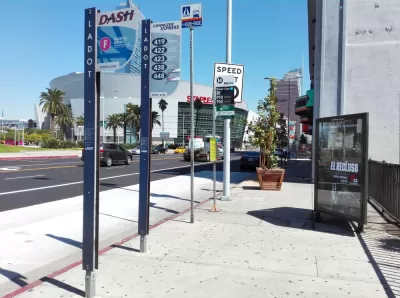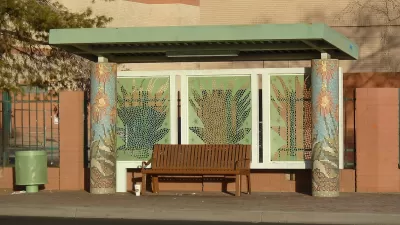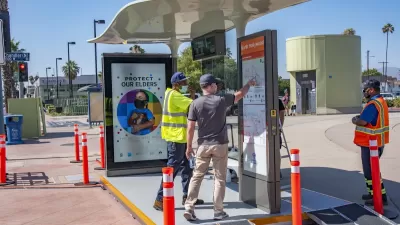Bus riders in Los Angeles frequently lack protection from sun and extreme heat, with bus stops in some of the county’s hottest areas having the worst amenities.

If you’ve taken a bus in Los Angeles, chances are you’ve noticed a few desolate bus stops that lack shelters, seating, or nearby trees to offer protection from extreme heat, rain, or wind. Dan Zukowski describes the situation in Smart Cities Dive, referencing a new study from the University of California, Los Angeles, Lewis Center for Regional Policy Studies that reveals that only 26 percent of Los Angeles County bus stops have shelters.
The problem isn’t unique to the City of Angels: “According to data compiled by the Washington Post last year, less than 20% of more than 122,000 bus stops in use by 16 large U.S. transit agencies have bus shelters.”
As Zukowski explains, “Typically, local jurisdictions, not transit agencies, are responsible for installing and maintaining bus shelters, according to the report. That means that some cities will have substantially higher numbers of shelters while others will have relatively few.” The Lewis Center study noted that in Los Angeles County, “neighborhoods with high Latino populations average temperatures that are four degrees warmer than those with low Latino populations and that ‘extreme heat days are warmer in neighborhoods with more Black residents than those with fewer Black residents.’”
As extreme heat becomes more common, the study’s authors write, “government partners will need to prioritize where new shelters are installed and consider how to maximize their benefits.”
FULL STORY: Most Los Angeles County bus stops lack protection from extreme heat

Montreal Mall to Become 6,000 Housing Units
Place Versailles will be transformed into a mixed-use complex over the next 25 years.

Planetizen Federal Action Tracker
A weekly monitor of how Trump’s orders and actions are impacting planners and planning in America.

DARTSpace Platform Streamlines Dallas TOD Application Process
The Dallas transit agency hopes a shorter permitting timeline will boost transit-oriented development around rail stations.

Bicycles and Books — In Sacramento, Libraries Now Offer Both
Adult library card holders can check out e-bikes and e-trikes for up to one week.

Colorado Landfills Emit as Much Pollution as 1M Cars
Landfills are the third-largest source of methane pollution in Colorado, after agriculture and fossil fuel extraction.

Tulsa Paid Remote Workers $10,000 to Move In — Nearly All of Them Stayed
The Tulsa Remote program generated more than $4 in local economic benefits for every dollar spent.
Urban Design for Planners 1: Software Tools
This six-course series explores essential urban design concepts using open source software and equips planners with the tools they need to participate fully in the urban design process.
Planning for Universal Design
Learn the tools for implementing Universal Design in planning regulations.
City of Mt Shasta
City of Camden Redevelopment Agency
City of Astoria
Transportation Research & Education Center (TREC) at Portland State University
City of Camden Redevelopment Agency
Municipality of Princeton (NJ)
Regional Transportation Commission of Southern Nevada





























